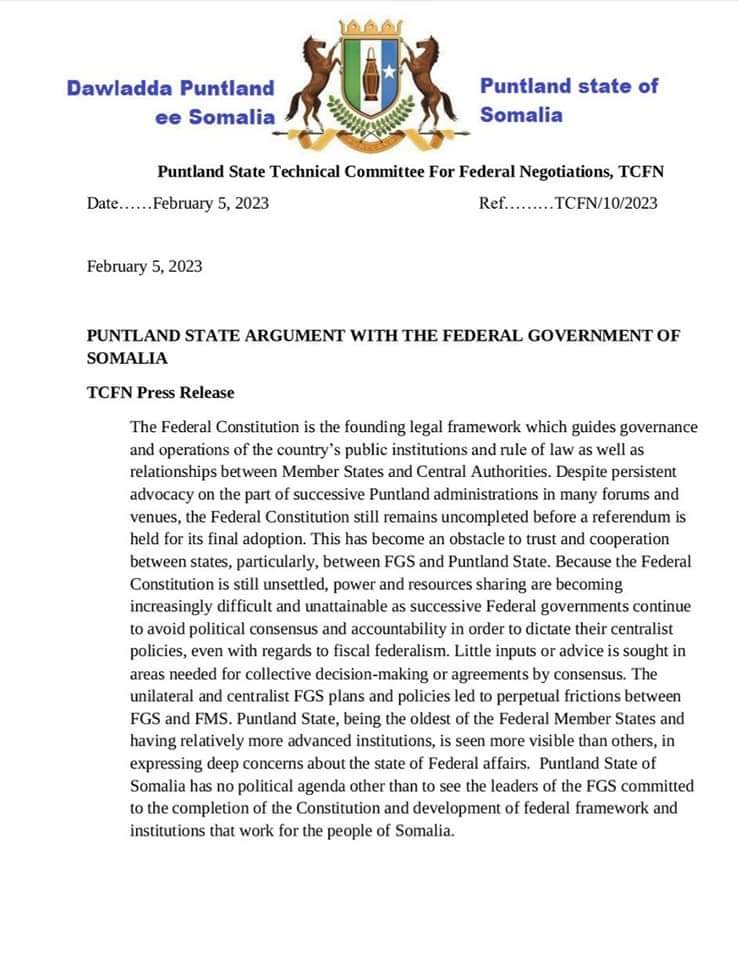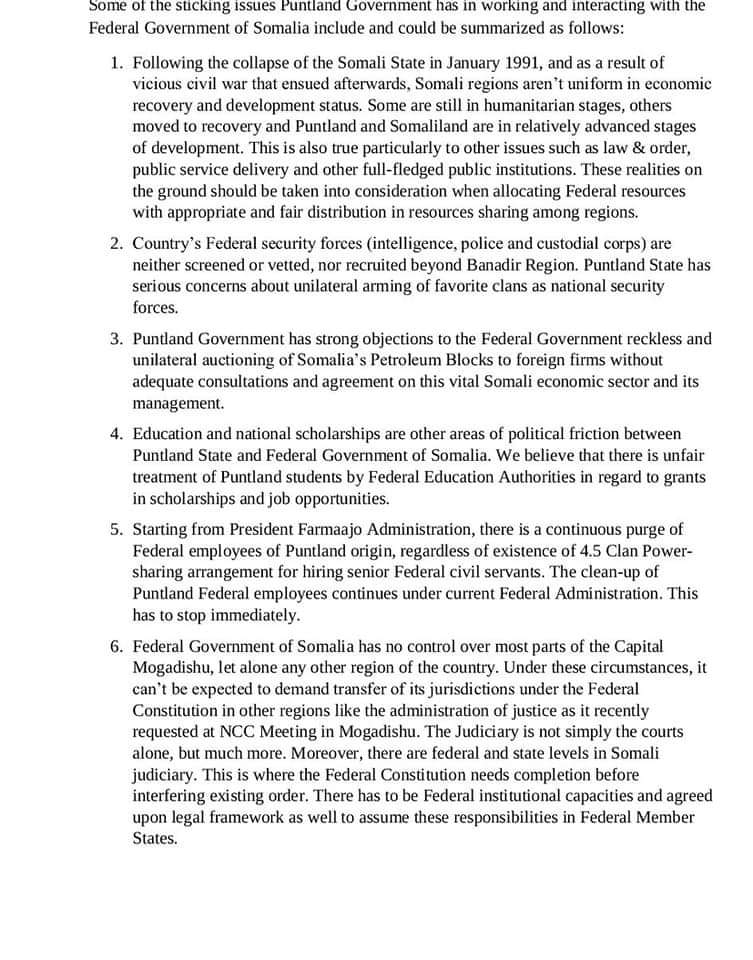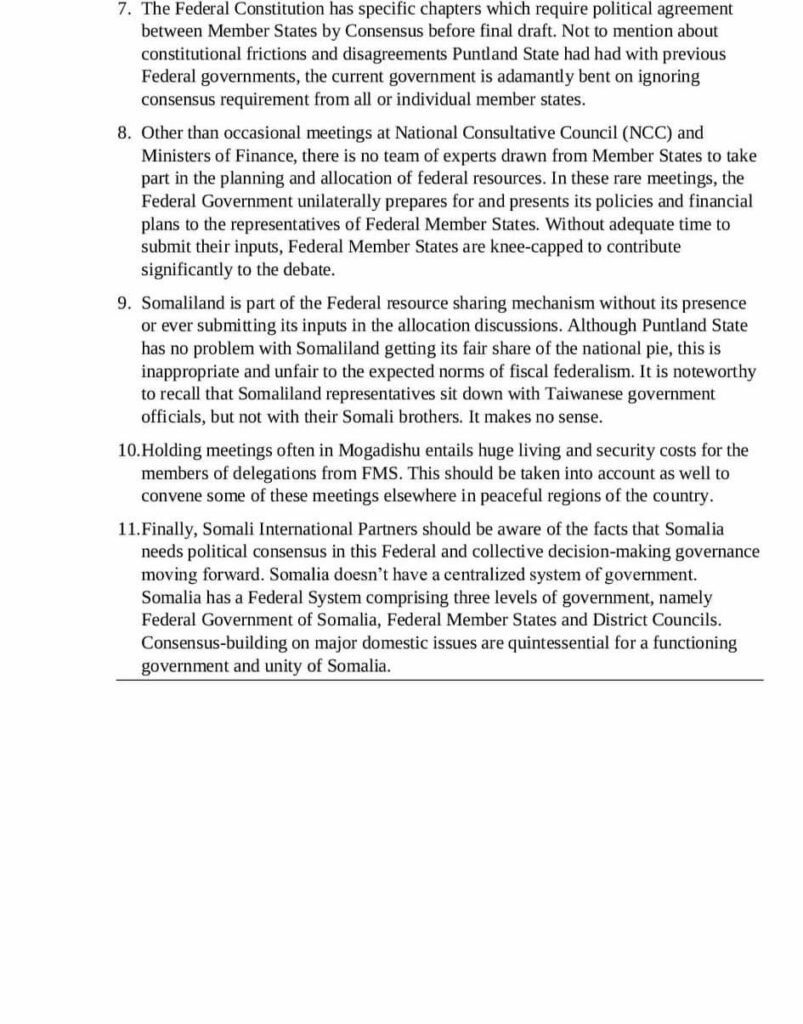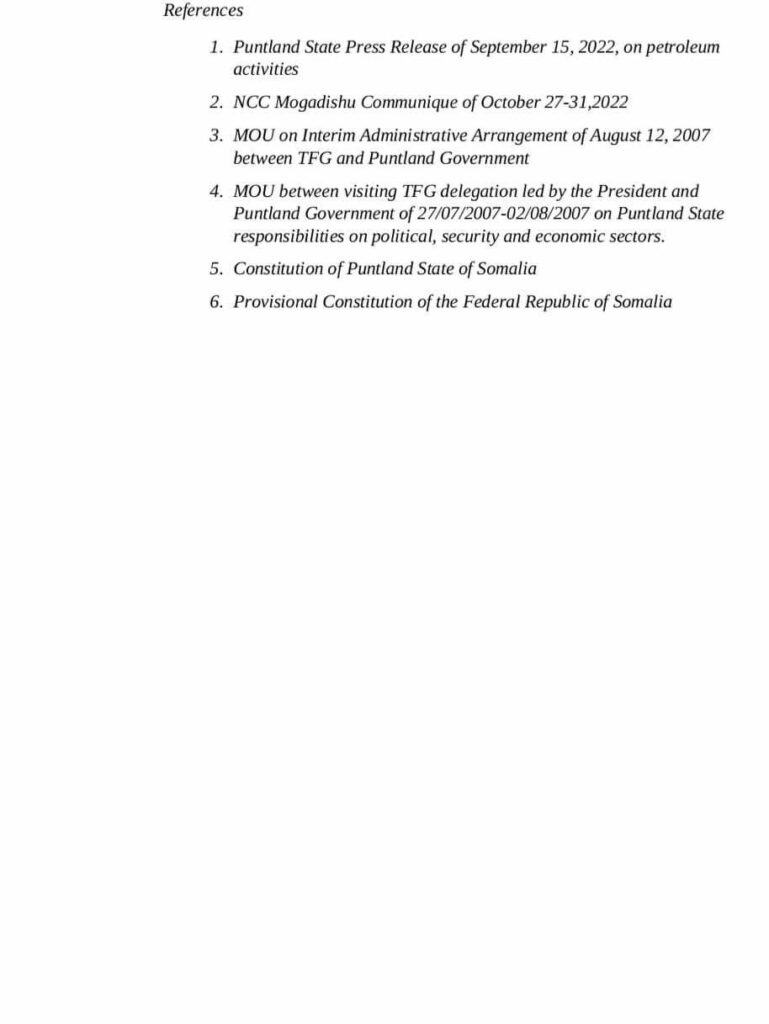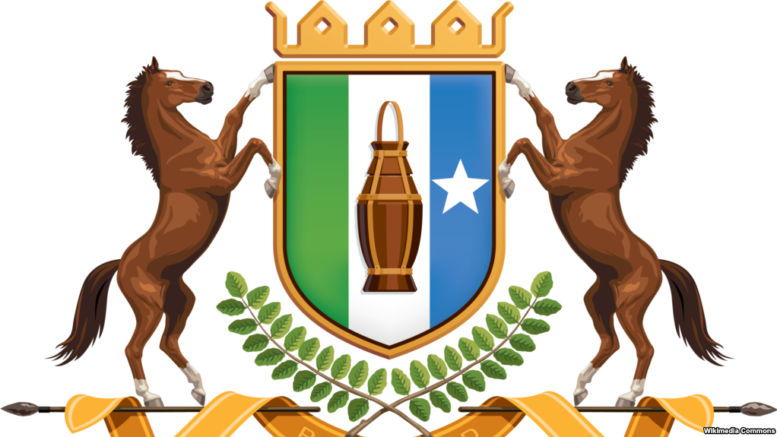PRESS_RELEASE: Puntland State Technical Committee For Federal Negotiations, TCFN
Date: February 5, 2023 Ref………TCFN/10/2023
PUNTLAND STATE ARGUMENT WITH THE FEDERAL GOVERNMENT OF SOMALIA
TCFN Press Release
The Federal Constitution is the founding legal framework which guides governance and operations of the country’s public institutions and rule of law as well as relationships between Member States and Central Authorities.
Despite persistent advocacy on the part of successive Puntland administrations in many forums and venues, the Federal Constitution still remains uncompleted before a referendum is held for its final adoption. This has become an obstacle to trust and cooperation between states, particularly, between FGS and Puntland State. Because the Federal Constitution is still unsettled, power and resources sharing are becoming increasingly difficult and unattainable as successive Federal governments continue to avoid political consensus and accountability in order to dictate their centralist policies, even with regards to fiscal federalism.
Little inputs or advice is sought in areas needed for collective decision-making or agreements by consensus. The unilateral and centralist FGS plans and policies led to perpetual frictions between FGS and FMS.
Puntland State, being the oldest of the Federal Member States and having relatively more advanced institutions, is seen more visible than others, in expressing deep concerns about the state of Federal affairs. Puntland State of Somalia has no political agenda other than to see the leaders of the FGS committed to the completion of the Constitution and development of federal framework and institutions that work for the people of Somalia.
Some of the sticking issues Puntland Government has in working and interacting with the Federal Government of Somalia include and could be summarized as follows:
- Following the collapse of the Somali State in January 1991, and as a result of vicious civil war that ensued afterwards, Somali regions aren’t uniform in economic recovery and development status. Some are still in humanitarian stages, others moved to recovery and Puntland and Somaliland are in relatively advanced stages of development. This is also true particularly to other issues such as law & order, public service delivery and other full-fledged public institutions. These realities on the ground should be taken into consideration when allocating Federal resources with appropriate and fair distribution in resources sharing among regions.
- Country’s Federal security forces (intelligence, police and custodial corps) are neither screened or vetted, nor recruited beyond Banadir Region. Puntland State has serious concerns about unilateral arming of favorite clans as national security forces.
- Puntland Government has strong objections to the Federal Government reckless and unilateral auctioning of Somalia’s Petroleum Blocks to foreign firms without adequate consultations and agreement on this vital Somali economic sector and its management.
- Education and national scholarships are other areas of political friction between Puntland State and Federal Government of Somalia. We believe that there is unfair treatment of Puntland students by Federal Education Authorities in regard to grants in scholarships and job opportunities.
- Starting from President Farmaajo Administration, there is a continuous purge of Federal employees of Puntland origin, regardless of existence of 4.5 Clan Power-sharing arrangement for hiring senior Federal civil servants. The clean-up of Puntland Federal employees continues under current Federal Administration.This has to stop immediately.
- Federal Government of Somalia has no control over most parts of the Capital Mogadishu, let alone any other region of the country. Under these circumstances, it can’t be expected to demand transfer of its jurisdictions under the Federal Constitution in other regions like the administration of justice as it recently requested at NCC Meeting in Mogadishu.
The Judiciary is not simply the courts alone, but much more. Moreover, there are federal and state levels in Somali judiciary. This is where the Federal Constitution needs completion before interfering existing order. There has to be Federal institutional capacities and agreed upon legal framework as well to assume these responsibilities in Federal Member States.
- The Federal Constitution has specific chapters which require political agreement between Member States by Consensus before final draft. Not to mention about constitutional frictions and disagreements Puntland State had had with previous Federal governments, the current government is adamantly bent on ignoring consensus requirement from all or individual member states.
- Other than occasional meetings at National Consultative Council (NCC) and Ministers of Finance, there is no team of experts drawn from Member States to take part in the planning and allocation of federal resources. In these rare meetings, the Federal Government unilaterally prepares for and presents its policies and financial plans to the representatives of Federal Member States. Without adequate time to submit their inputs, Federal Member States are knee-capped to contribute significantly to the debate.
- Somaliland is part of the Federal resource sharing mechanism without its presence or ever submitting its inputs in the allocation discussions. Although Puntland State has no problem with Somaliland getting its fair share of the national pie, this is inappropriate and unfair to the expected norms of fiscal federalism. It is noteworthy to recall that Somaliland representatives sit down with Taiwanese government officials, but not with their Somali brothers. It makes no sense.
- Holding meetings often in Mogadishu entails huge living and security costs for the members of delegations from FMS. This should be taken into account as well to convene some of these meetings elsewhere in peaceful regions of the country.
- Finally, Somali International Partners should be aware of the facts that Somalia needs political consensus in this Federal and collective decision-making governance moving forward. Somalia doesn’t have a centralized system of government. Somalia has a Federal System comprising three levels of government, namely Federal Government of Somalia, Federal Member States and District Councils.
Consensus-building on major domestic issues are quintessential for a functioning government and unity of Somalia.
References
- Puntland State Press Release of September 15, 2022, on petroleum activities
- NCC Mogadishu Communique of October 27-31,2022
- MOU on Interim Administrative Arrangement of August 12, 2007 between TFG and Puntland Government
- MOU between visiting TFG delegation led by the President and Puntland Government of 27/07/2007-02/08/2007 on Puntland State responsibilities on political, security and economic sectors.
- Constitution of Puntland State of Somalia
- Provisional Constitution of the Federal Republic of Somalia
END
